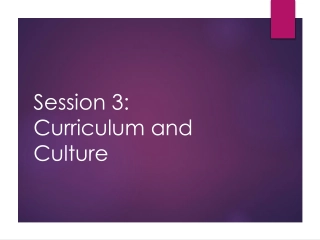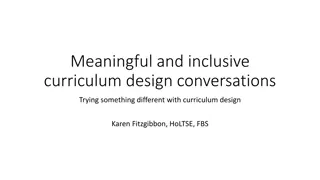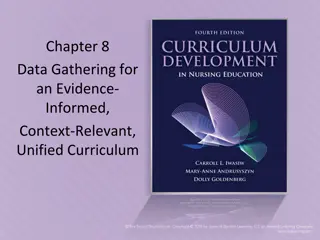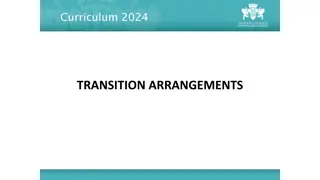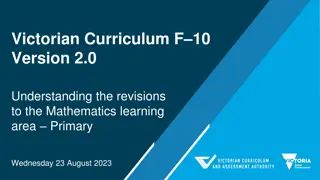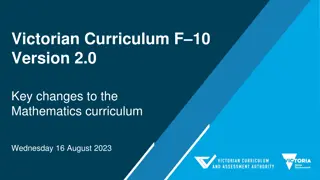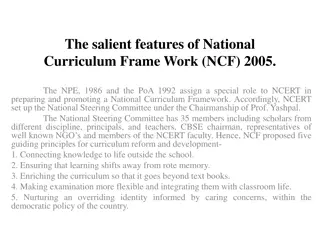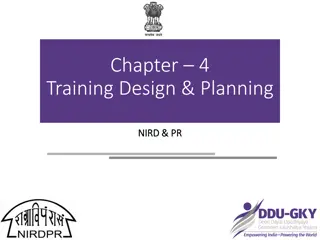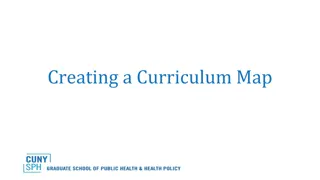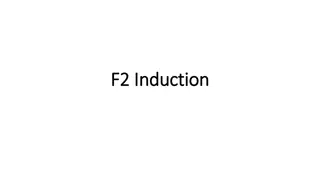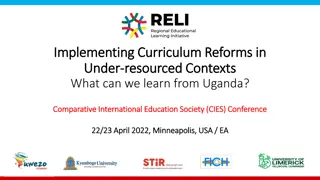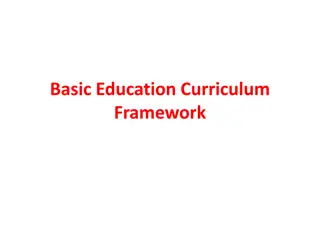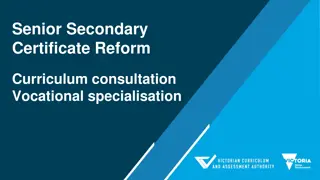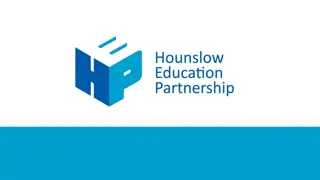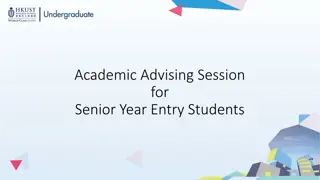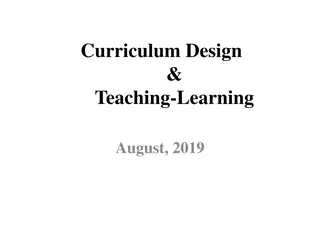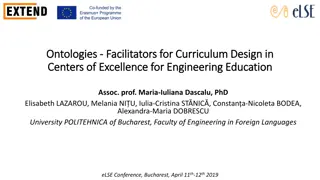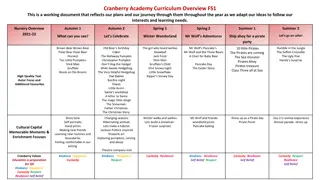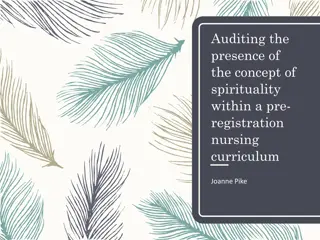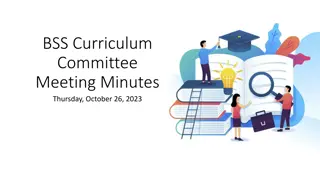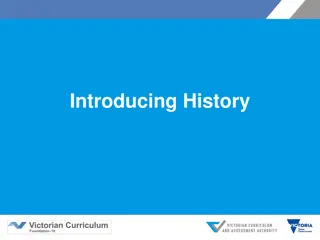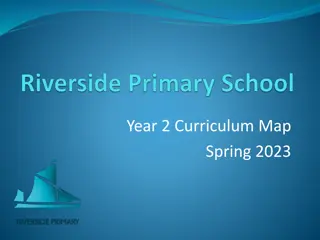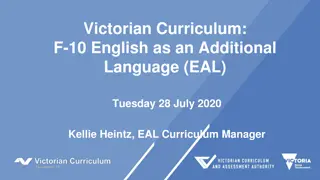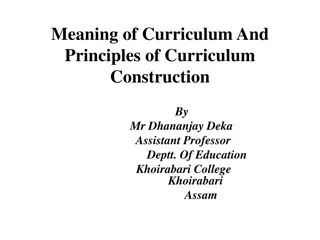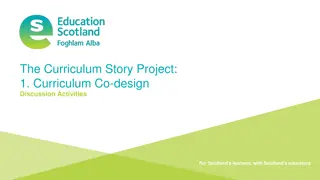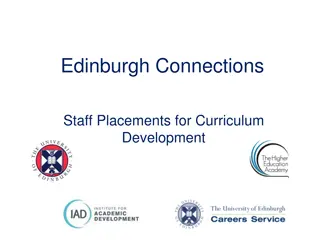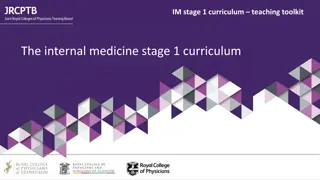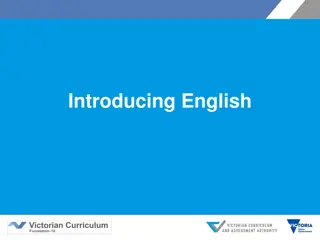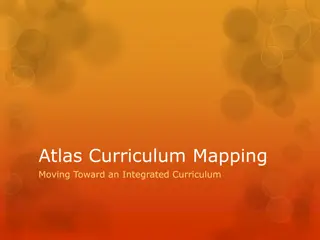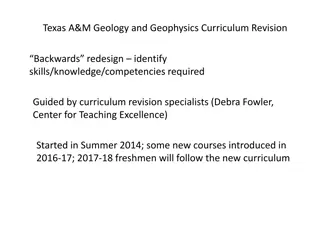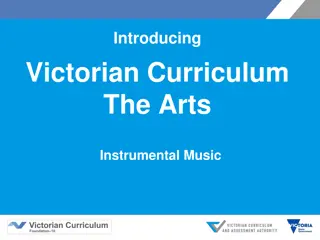Knowledge and Curriculum
Various forms of curriculum, the importance of curriculum, new trends in education, and the relationship between power and ideology in curriculum development. Understand the role of the state in curriculum development and the impact of meritocracy on the curriculum.
2 views • 16 slides
Knowledge and Curriculum
The principles of curriculum development to improve education quality, align curriculum with teaching methods, and meet student needs. Discover how innovative curriculum design influences learning outcomes and fosters independent thinking. Curriculum planners play a crucial role in creating effectiv
1 views • 21 slides
Session 3: Curriculum and Culture
The complex relationship between curriculum and culture, including how culture influences curriculum production, the cultural messages within curriculums, and who is advantaged or disadvantaged by the curriculum.
0 views • 17 slides
The Significance of Curriculum Development in Early Childhood Education_removed
Curriculum development process is vital in education, ensuring a suitable and engaging learning experience for early childhood education. It involves constantly improving and adapting the curriculum to meet the needs of children, bridging the gap between knowledge and reality expectations. Teachers
2 views • 1 slides
Unpacking the New ELAL Curriculum for Grades 4-6
In the spirit of reconciliation, acknowledgment of traditional Treaty lands in Alberta is highlighted, emphasizing the importance of understanding Indigenous history. The journey to the new curriculum is depicted along with the direction for curriculum development in Alberta, focusing on promoting s
1 views • 50 slides
Meaningful and inclusive curriculum design conversations
In a quest for meaningful and inclusive curriculum design, Karen Fitzgibbon explores a new approach to engage course teams in enhancing curriculum design. By addressing internal and external drivers for change, the aim is to facilitate inclusive conversations that promote learner-centered models and
1 views • 10 slides
Understanding Contextual Factors in Curriculum Development
This chapter delves into the significance of internal and external contextual factors in shaping curriculum development. It discusses the process of gathering essential contextual data, identifying relevant sources, and integrating data to create an evidence-informed, context-relevant, unified curri
5 views • 31 slides
Transition Arrangements for Curriculum Change in August 2024
Transition arrangements for the Curriculum 2024 involve changes in training levels, minimum training periods, and the completion criteria at each level. Academic trainees have options regarding transitioning to the new curriculum based on specific timelines. Progression through various training leve
4 views • 20 slides
Victorian Curriculum F-10 Version 2.0 Revision Overview
The Victorian Curriculum F-10 is undergoing revisions, with a focus on the Mathematics learning area for primary education. The curriculum acknowledges the traditional custodians of the land and aims to provide high-quality teaching resources aligned with Victorian standards. The VCAA, a statutory a
5 views • 51 slides
Overview of Victorian Curriculum F-10 Mathematics Curriculum Revisions
The Victorian Curriculum F-10 is being revised to incorporate content from the Australian Curriculum Version 9.0 with the aim of making it more manageable and aligned with Victorian priorities. The revisions focus on ensuring efficient implementation, strengthening student access to essential knowle
10 views • 23 slides
Overview of Victorian Curriculum F-10 Mathematics Revision
This document outlines key changes in the Victorian Curriculum F-10 Mathematics curriculum, including acknowledgments of the traditional custodians of the land, objectives alignment, what has not changed, and the timeline for implementation starting from 2024. The revisions aim to provide more manag
0 views • 43 slides
National Curriculum Framework (NCF) 2005 - Salient Features Summary
The National Curriculum Framework (NCF) 2005 outlines significant changes in education, focusing on connecting knowledge outside of school, moving away from rote memorization, enriching the curriculum beyond textbooks, making examinations more flexible, and nurturing an identity rooted in caring and
0 views • 7 slides
Governance & the Curriculum Committee: Understanding Regulations and Structures for Effective Governance
This session explores the regulations and governance structures related to curriculum committees in colleges and districts, emphasizing the partnership between administration and academic senate. Key topics include establishing curriculum committees, examples of committee setups, and discussions on
2 views • 25 slides
Implementing Effective Training Design and Planning Strategies
Explore Chapter 4 of the NIRD & PR guidelines focusing on training design, planning, assessment, and certification. Learn about creating training plans, domain curriculum alignment, resource allocation, and course scheduling for both residential and non-residential courses. Gain insights into best p
0 views • 15 slides
Creating a Curriculum Map for Competency-Based Education
This presentation aims to guide faculty and staff in competency-based curriculum mapping at the program level. It covers the definition of curriculum mapping, a recommended framework, steps for identifying program competencies, developing a matrix, and mapping courses to competencies. Utilize this r
0 views • 11 slides
Overview of Foundation Year 2 (F2) Training Program Changes and Curriculum Updates
The Foundation Year 2 (F2) training program entails significant differences from F1, including increased clinical responsibility and decision-making skills. F2 trainees are also responsible for managing F1s, preparing for the next stage of training, and studying for leave. Changes for this year incl
0 views • 24 slides
Implementing Curriculum Reforms in Under-resourced Contexts: Lessons from Uganda
Explore how Uganda is implementing curriculum reforms in under-resourced contexts to address the quality of education and graduate employability. The discussion delves into the challenges faced in the Ugandan education system, the introduction of a competency-based lower secondary curriculum, and a
1 views • 21 slides
Enhancing Basic Education Curriculum Framework for Effective Implementation
Explore the Basic Education Curriculum Framework, learning outcomes, key areas covered, suggested learning experiences, and vision statements for curriculum reforms in Kenya. Dive into the national goals of education, core competencies, and organization of basic education to empower educators and st
0 views • 47 slides
Proposed Senior Secondary Certificate Reform Curriculum Consultation for Vocational Specialisation
A new curriculum is being proposed for vocational specialisation in senior secondary certificates in Victoria. The curriculum focuses on providing flexible pathways for students with standards-based assessments, offering courses aligned with students' needs and aspirations. Feedback on the draft cur
0 views • 19 slides
Insights into the New OFSTED Framework Pilot at Ivybridge Primary
The New OFSTED Framework Pilot at Ivybridge Primary focuses on safeguarding, effective systems for identifying at-risk pupils, curriculum support, and management of procedures. Schools under the pilot will experience changes in inspection methodology and emphasis on the Quality of Education. The mai
0 views • 17 slides
Academic Advising and Curriculum Structure for Senior Year Entry Students
Academic advising session for senior year entry students at the University of Science and Technology includes information on pre-registration, curriculum structure, duration of study, and course registration. Students follow a common core curriculum and can pursue additional majors or minors. The pr
0 views • 33 slides
Understanding Curriculum Design and Program Outcomes in Education
Exploring the critical terms COs and POs, this content delves into the short definitions of COs and POs, emphasizing the mapping of COs onto POs. It highlights how curriculum, assessment, and evaluation are integral in achieving program outcomes. The significance of SAR in evaluating curriculum deve
4 views • 51 slides
Leveraging Ontologies for Modern Curriculum Design in Engineering Education
Developing a contemporary academic curriculum requires adherence to industry demands, connectivity to global programs, and incorporation of technological tools like ontologies. Discover how ontologies facilitate curriculum design and the transition from conventional to modern approaches, highlightin
0 views • 20 slides
Cranberry Academy Nursery Curriculum Overview for FS1
This detailed document outlines the curriculum overview for the Nursery program at Cranberry Academy, highlighting themes, activities, assessment opportunities, parental involvement, and the focus on key developmental areas throughout the academic year. The curriculum emphasizes a diverse range of t
0 views • 9 slides
Recertification and Assessment of Core Curriculum Courses
The Core Curriculum Council of the Faculty Senate presents a process for recertification and assessment of core curriculum courses to maintain integrity and quality. Courses must be recertified every four years to ensure consistency amidst changes in instructors, content, and teaching methods. State
0 views • 33 slides
Audit of Spirituality in a Nursing Curriculum by Joanne Pike
Joanne Pike conducted an audit to assess the incorporation of spirituality in a pre-registration nursing curriculum. The presence of spiritual concepts was analyzed within the curriculum document, individual module learning outcomes, and practice learning outcomes. Results revealed varying levels of
4 views • 10 slides
BSS Curriculum Committee Meeting Overview
The BSS Curriculum Committee Meeting discussed the need to update the curriculum process due to the increasing workload and impending retirement of key personnel. The meeting also compared curriculum processes in different divisions, highlighting the roles of faculty and staff in managing curriculum
0 views • 9 slides
Exploring the Victorian Curriculum for History Education
The Victorian Curriculum F-10 for History aims to foster lifelong interest in historical study, develop critical thinking skills, and enable students to become informed citizens. The curriculum structure includes strands, achievement standards, and a focus on historical concepts and skills. Key mess
1 views • 5 slides
Year 2 Curriculum Highlights for Spring 2023
The Year 2 curriculum for Spring 2023 covers topics in Maths, Literacy, and Wider Curriculum. In Maths, students will focus on recognizing equal groups, understanding multiplication, practicing times tables, and more. Literacy activities include writing narratives, character descriptions, and guided
1 views • 7 slides
Importance of the New Victorian Curriculum F-10 EAL
The new Victorian Curriculum F-10 EAL aims to establish EAL as a standalone curriculum, provide a consistent structure across all learning areas, and recognize the diverse backgrounds and learning experiences of EAL students in Victoria. It also focuses on supporting the specific needs of EAL studen
0 views • 29 slides
Understanding Curriculum and Principles of Curriculum Construction
Curriculum is the core of the school system, facilitating the transmission of knowledge from teachers to students. It encompasses the courses, activities, and learning environment provided to pupils. Principles of curriculum construction include child-centeredness, individual differences, co-relatio
0 views • 8 slides
Rutherford High School Curriculum Overview
Rutherford High School offers a comprehensive curriculum ranging from English to Mathematics. The curriculum night provides an overview of courses offered, course selection process, and graduation requirements. Students must complete four years of English and Mathematics, including specific assessme
0 views • 37 slides
Curriculum Co-design Activities for Scotland's Educators
Practical activities and discussion points aimed at educators in Scotland to enhance curriculum co-design and interdisciplinary learning. The Curriculum Story Project provides case studies and ideas to promote collaborative planning and innovative approaches to curriculum development. The activities
0 views • 17 slides
Overview of Victorian Curriculum Mathematics F-10
The Victorian Curriculum Mathematics F-10 provides a comprehensive framework for the development of mathematical skills from Foundation to Level 10, incorporating the Australian Curriculum while reflecting Victorian priorities and standards. It aims to equip students with essential numeracy skills f
0 views • 26 slides
Enhancing Curriculum Development Through Staff Placements
A pilot project supported by the HEA focused on providing industrial placements for academic and professional service staff to increase understanding of employer engagement in curriculum design. The project involved three HEIs - Aston University, University of Edinburgh, and University of Nottingham
0 views • 10 slides
Internal Medicine Stage 1 Curriculum Overview
This comprehensive guide details the Internal Medicine Stage 1 Curriculum, highlighting key components such as curriculum structure, curriculum changes, training pathways, specialty groups, and unchanged practices. The curriculum is designed to enhance training and assessment in areas like geriatric
0 views • 12 slides
Overview of Victorian English Curriculum
The Victorian Curriculum F-10, released in September 2015, serves as a foundational component of the Education State, aligning with the Australian Curriculum while reflecting Victorian priorities and standards. The English curriculum prioritizes language skills development through listening, reading
0 views • 9 slides
Enhancing Curriculum Development through Mapping for Schools
Curriculum mapping in schools involves using electronic tools to input, track, and analyze data related to curriculum, enabling stakeholders to meet standards, align content, collect real-time data on instruction, and reflect on practices for continuous improvement. Software programs like Rubicon At
1 views • 15 slides
Texas A&M Geology & Geophysics Curriculum Revision and Development
Involving a backward redesign led by curriculum revision specialists, the Texas A&M Geology and Geophysics curriculum has been undergoing changes since 2014. The revision aims to identify the necessary skills, knowledge, and competencies for students. It includes new courses introduced in 2016-17, w
0 views • 5 slides
Victorian Curriculum in the Arts: An Overview
Explore the Victorian Curriculum framework for Instrumental Music and its integration with the Arts disciplines such as Dance, Drama, Media Arts, Music, Visual Arts, and Visual Communication Design. The curriculum provides a structured approach for teaching and learning across different year levels,
0 views • 28 slides


